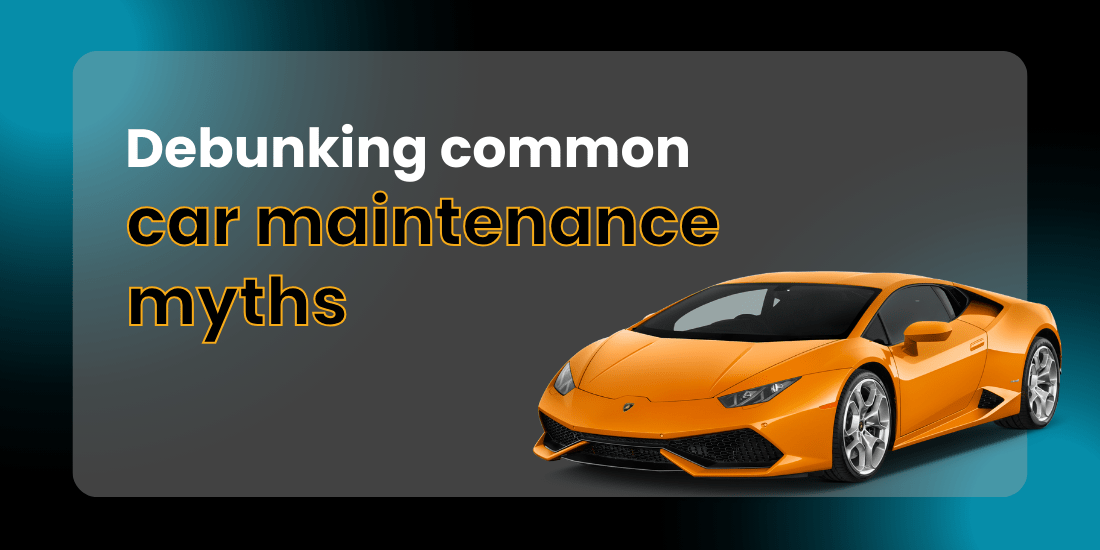Owning a vehicle comes with a significant responsibility: regular maintenance. It’s not just about safety; it’s also a smart financial decision. Proper maintenance ensures your car’s longevity and reliability. However, the world of car maintenance is often clouded by myths that can lead car owners down the wrong path. In this comprehensive guide, we’ll debunk some of the most pervasive car maintenance myths, empowering you to make informed decisions about the upkeep of your vehicle.
One of the most enduring car maintenance myths is the belief that you must change your oil every 3,000 miles. For decades, this advice was gospel. However, it’s important to understand that this counsel was more relevant in the past when conventional motor oils were less advanced. Modern synthetic oils have come a long way and are designed to last much longer. Most car manufacturers and oil experts now recommend changing your oil every 5,000 to 7,500 miles. This recommended mileage range depends on factors like the type of oil used and your driving habits. To get specific guidance, you should consult your owner’s manual, where you’ll find manufacturer-specific recommendations. This update is not only convenient but also more environmentally friendly and cost-effective.
The myth that premium fuel is always better for your car is a common misconception. It’s often associated with the belief that using premium fuel can lead to better performance and greater longevity for your vehicle. In reality, this myth is far from the truth. Unless your car’s manufacturer explicitly states that premium fuel is required, there’s no significant benefit to using it. Modern engines are designed to work efficiently with regular unleaded fuel. The extra cost of premium fuel, when it’s not required, amounts to a waste of money. There’s no practical reason to pay more for premium fuel unless your car’s owner’s manual explicitly calls for it.
The automotive market is filled with products that claim to improve engine performance, improve fuel efficiency, or reduce wear and tear on your engine. These products often make grand promises about what they can achieve, but they’re not always in your vehicle’s best interest. Most reputable automakers and industry experts discourage the use of such additives. Your vehicle’s engine is meticulously engineered to operate optimally with the fuel and oil recommended in the owner’s manual. Using additives can often do more harm than good. In fact, they can potentially cause damage to your engine, leading to costly repairs down the road. So, in most cases, it’s best to stick to your manufacturer’s guidelines regarding what to put in your engine.
Warming up your car’s engine by idling before driving was a common practice in the past, especially in colder climates. However, it’s no longer a necessary or efficient practice with modern vehicles. In the past, vehicles had carburetors, and warming up the engine was necessary to prevent stalling and other issues. With today’s fuel-injected engines, extended idling is unnecessary. Idling your engine for an extended period is not only a waste of fuel, but it also contributes to pollution. A better approach to warm up your engine is to drive gently for the first few minutes until it reaches its optimal operating temperature. This not only saves fuel but is also better for the environment.
Many people believe that inflating their tires to the maximum PSI (pounds per square inch) listed on the sidewall of the tire is the way to go. This, however, is a misconception that can lead to problems. The recommended tire pressure for your vehicle is specified by the manufacturer, and you can find this information in your owner’s manual or on a sticker located inside the driver’s side door jamb. Inflating your tires to the maximum PSI from the sidewall can lead to overinflation, which can reduce traction and make your ride uncomfortable. On the other hand, underinflating your tires can decrease fuel efficiency and shorten tire life. It’s crucial to follow the manufacturer’s recommendations for tire pressure to ensure optimal performance, safety, and comfort.
Another common myth is that you can use regular dish soap to wash your car. This idea is rooted in the belief that dish soap is effective in removing dirt and grime. However, dish soap is not formulated for car paint. It can strip away wax, leaving your car’s finish vulnerable to damage. It’s better to invest in a quality car wash soap specifically designed for the purpose. Car wash soaps are formulated to clean your vehicle without harming the paint or protective wax. By using the right products, you can keep your car looking great while avoiding unnecessary paint damage.
It’s a widespread belief that when one tire needs replacing, you should replace all four tires at once. This is often considered a safe and balanced approach. While it’s a good practice to replace both sets of tires at the same time to ensure even wear, it’s not an absolute rule. In many cases, this practice is unnecessary and costly. Modern vehicles can often have individual tires replaced without issue. However, some key considerations must be kept in mind. The new tire should have a similar tread pattern, be of the same size, and meet the manufacturer’s recommendations. This approach can save you money without compromising safety or performance.
Another prevalent car maintenance myth suggests that flushing the transmission fluid can dislodge debris and lead to transmission problems. In reality, changing the transmission fluid as per the manufacturer’s recommendations helps maintain the transmission’s health. A professional flush is generally safe and can improve the performance and longevity of your transmission. Regular transmission fluid changes can help prevent the buildup of harmful deposits and extend the life of your transmission. Just ensure you follow the manufacturer’s recommended maintenance schedule to ensure that your transmission stays in excellent condition.
It’s often said that when it comes to replacing brake pads, you should replace them in pairs. While this is generally good advice, it’s not an absolute rule. If one set of brake pads is significantly more worn than the other, replacing only the worn set is a viable option. The most critical factor is to ensure that your braking system is balanced and that your vehicle stops evenly. Replacing only one set of brake pads is acceptable if the other set still has a considerable amount of wear remaining and doesn’t show signs of significant damage. However, if you’re uncertain about your brakes, it’s always a good idea to consult with a professional mechanic to determine the best course of action.
Among the many car maintenance myths, perhaps the most misleading and potentially damaging is the belief that regular maintenance is unnecessary as long as your vehicle seems to be running fine. This misconception can lead car owners down a treacherous path of neglect, resulting in major breakdowns and costly repairs. In this section, we will debunk this myth and emphasize the vital importance of regular maintenance in keeping your vehicle in top shape.

